HOME > ACKNOWLEDGE > Support
Support
Peking Union Medical College Hospital
Peking Union Medical College Hospital (PUMCH) is a Class A tertiary comprehensive hospital committed to delivering state-of-the-art clinical care, innovative scientific research and rigorous medical education. It is designated by the National Health Commission as one of the national referral centers offering diagnostic and therapeutic care of complex and rare disorders, national demonstrative bases for higher medical education and standardized residency training, core national for clinical research and technological innovation, as well as one of the earliest Chinese hospitals offering medical care to senior leaders and foreign patients. PUMCH enjoys high reputation for its full range of disciplines, cutting-edge technologies and outstanding specialties.

The Department of Orthopedics, Peking Union Medical College Hospital
The Department of orthopedics of PUMCH, founded in the 1920s, is China’s first-class orthopedic clinical and research center. It has three orthopedic centers of spine, joint, and trauma. The department is the first center providing comprehensive management and treatment for scoliosis patients in China. Under the leadership of the former chairman of the orthopedic branch of the Chinese Medical Association, Professor Qiu Guixing, a member of the Chinese Academy of Engineering, the department has established a large specimen biobank containing the detailed information of clinical documents, imaging and biological samples of scoliosis and associated disorders.

The Department of Molecular & Human Genetics, Baylor College of Medicine
The Molecular and Human Genetics department of Baylor College of Medicine is ranked first in the USA in grants and funding from the National Institutes of Health. The offers a variety of research, clinical, and training programs in genetics to graduate, medical, and postdoctoral students. The facilities in the department are equipped with state-of-the-art instrumentation for research in molecular, cellular, and biochemical genetics. In addition, there are several facilities for specialized techniques to support the research efforts. Among these are core laboratories for microarray analysis, next-generation sequencing, production of transgenic and knockout mice, mouse phenotyping, microscopy and imaging, confocal microscopy, high throughput screening, siRNA screening, and other techniques.

